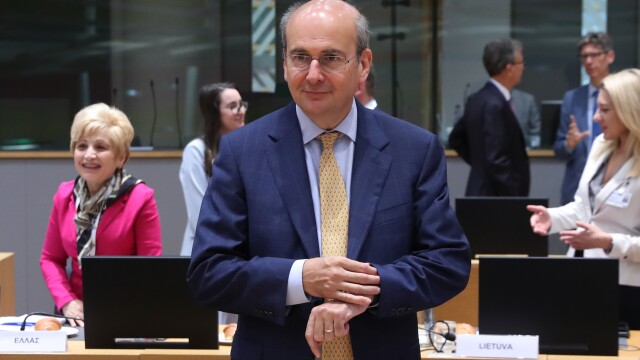The proposals presented by Kostis Hatzidakis at the meeting of European Finance Ministers include coordinated actions and synergies at a pan-European level to build a “defense” against inflation and mobilize pension fund capital for greater “firepower” to bring investments, development, and jobs to the continent. These proposals aim to address the new period unfolding in Europe after the European elections in June.
After a tumultuous five years marked by Brexit, the pandemic, lockdowns, the war in Ukraine, an energy crisis, and an unprecedented wave of inflation, and with significant international uncertainties ahead (such as in France and the upcoming US elections), Europe is reorganizing and striving to become more productive and competitive against global rivals.
In his intervention at the Eurogroup council, during the discussion on the so-called “Letta report” concerning the single European market, the Greek Minister of National Economy and Finance focused on the need to boost both private and public investments. He emphasized that “if Europe wants more investments, it must have correspondingly high ambitions. It should not remain merely in declarations and reports. The longer we delay, the more it works against us.”
Among other things, Kostis Hatzidakis proposed seeking more active participation of national pension funds in capital markets to improve the utilization of their funds, provided there are substantial guarantees of proper governance and the sustainability of these investments.
To guide future investments, the Greek proposals focus on five areas:
- Joint European Procurement: A pan-European policy for state procurements, where possible, to reduce costs for the European economy and boost its dynamics. This proposal follows the logic of decisions taken for joint procurements in the EU, such as the recent cases of vaccines and natural gas. This policy strengthens Europe’s role as a “major customer” and a powerful consumer, aiming to achieve economies of scale and greater negotiating power for Europe against international market players, who often act as a “coalition” of producers and suppliers (e.g., OPEC) to maximize their profits at will.
- Important Projects of Common European Interest: It is proposed to enhance funding for investments that are “strategic” for Europe. For example, the creation and completion of common energy networks (especially electricity) are imperative to balance electricity prices in Europe, which currently show massive distortions. Additionally, joint investments in defense (such as the European air defense system) support countries that bear a disproportionate burden on state budgets due to geographical location and proximity, such as Greece or Poland.
- Unification of Capital Markets aiming to create a true Union of Savings and Investments, as proposed by the Letta report presented at Ecofin.
- Completion of the Banking Union, with a guarantee of deposits at a pan-European level, which will directly and indirectly contribute to the strengthening of private investments.
- Investments in Human Capital to facilitate the diffusion of new knowledge and technologies, a fundamental requirement for enhancing competitiveness.

















